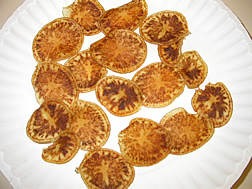Texas A&M AgriLife Research scientists have developed a new approach to countering citrus greening and potato zebra chip diseases, two economically devastating agricultural diseases in the U.S.
Their method uses spinach antimicrobial peptides, known as defensins, which naturally defend plants against a broad range of pathogens.
In a recent study published in Plant Biotechnology Journal, researchers showed that some spinach defensins can confer similar protection to citrus and potatoes—and possibly other crops. The effects show significant progress toward recovering yield and improving quality in diseased plants.
The study was led by Kranthi Mandadi, Ph.D., an AgriLife Research plant molecular biologist and professor in the Texas A&M Department of Plant Pathology and Microbiology, located at the Texas A&M AgriLife Research and Extension Center at Weslaco.
"Dr. Mandadi continues to demonstrate exceptional leadership and innovation in plant pathology, advancing solutions toward greater agricultural resilience and food security," said Amir Ibrahim, Ph.D., associate director and chief scientific officer of AgriLife Research. "His pioneering work, from hairy root technology to peptide treatments, exemplifies our commitment to scientific discovery that empowers farmers and sustains the agricultural economy in Texas and beyond."
Recovering citrus trees
Mandadi and his team chose spinach antimicrobial peptides after learning from previous studies that they can fend off various pathogenic fungi and bacteria. Because these peptides occur naturally in spinach, they're also frequently consumed by humans.
In 2021, the U.S. Environmental Protection Agency, EPA, concluded that dietary exposure to spinach defensins is safe for the U.S. population, including infants and children. This makes them an attractive choice for both effectiveness and safety, as they pose no known health risks.

Spinach defensins confer tolerance to 'Candidatus Liberibacter spp.'. Credit: Plant Biotechnology Journal (2025). DOI: 10.1111/pbi.70013
The researchers delivered the peptides to commercial citrus trees using a benign virus developed by University of Florida researchers, who collaborated on the study. The virus naturally infects the trees in the same location where the disease-causing bacteria reside. Using a simple grafting procedure, the researchers were able to apply the virus and allow it to deliver the peptides targeting the bacteria largely on its own.
Over a few years, the research team monitored how citrus trees infected with Candidatus Liberibacter asiaticus, the bacterium responsible for citrus greening, responded to treatment with specific antimicrobial peptides. They saw promising results, including up to 50% increases in fruit yield compared to untreated trees after only a single application.
Recovering potatoes—and more
Additionally, the researchers explored how the spinach peptides might enhance the immune response against Candidatus Liberibacter solanacearum. This bacterium is related to the citrus greening pathogen and causes zebra chip disease in potatoes and other vegetables.
When researchers expressed the antimicrobial peptides in potatoes, the potato plants showed minimal disease symptoms, had less disease-causing bacteria present, had much less of the characteristic zebra chip discoloration in tubers, and had greater tuber numbers compared to untreated plants.
Altogether, the team's results show encouraging effects for the two spinach antimicrobial peptides added independently to citrus and potatoes.
Looking forward, Mandadi plans to explore broader applications and expand the technology's possibilities. He envisions creating "cocktails" of multiple peptides and exploring the effects when combined with other integrated management strategies to control the insects spreading the bacteria as well.
"This is just the beginning," Mandadi said. "There's a lot of promise in these antimicrobial peptides as a new treatment for broader agricultural diseases. We're interested in seeing what other crops these peptides can support. I think it has the potential to become a new broad-spectrum treatment method for crops, alongside traditional agricultural practices."
Southern Gardens Citrus, a subsidiary of U.S. Sugar, has licensed patent rights for the defensins technology developed by AgriLife Research from The Texas A&M University System, as well as the use of the viral vector technology from the University of Florida. They are working with Silvec Biologics to commercialize this technology for use against the bacterium responsible for citrus greening. Silvec filed an application with the EPA in January 2024 to allow for commercial use, marking a critical step toward making this innovation accessible to growers.
Source - https://phys.org













